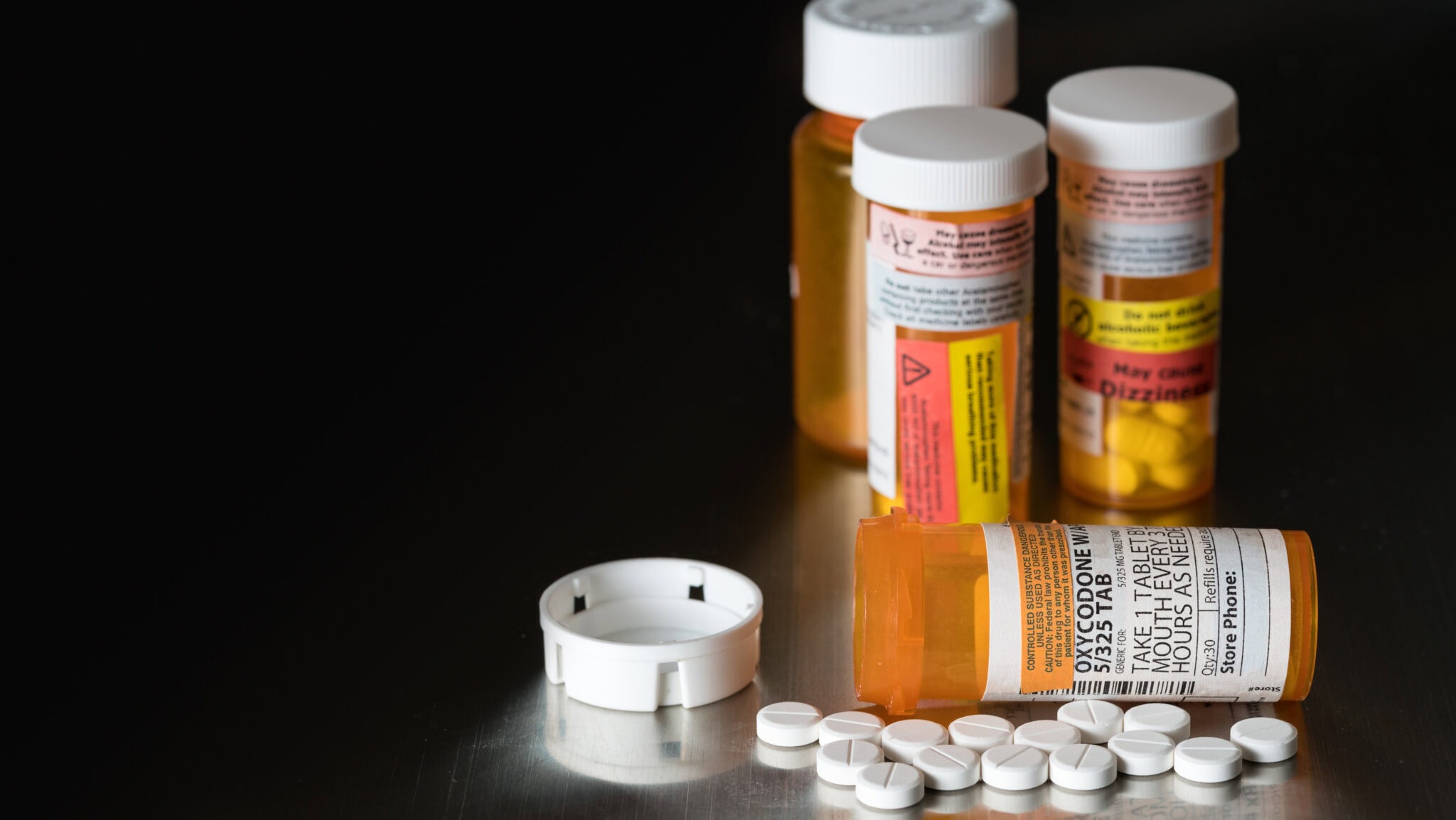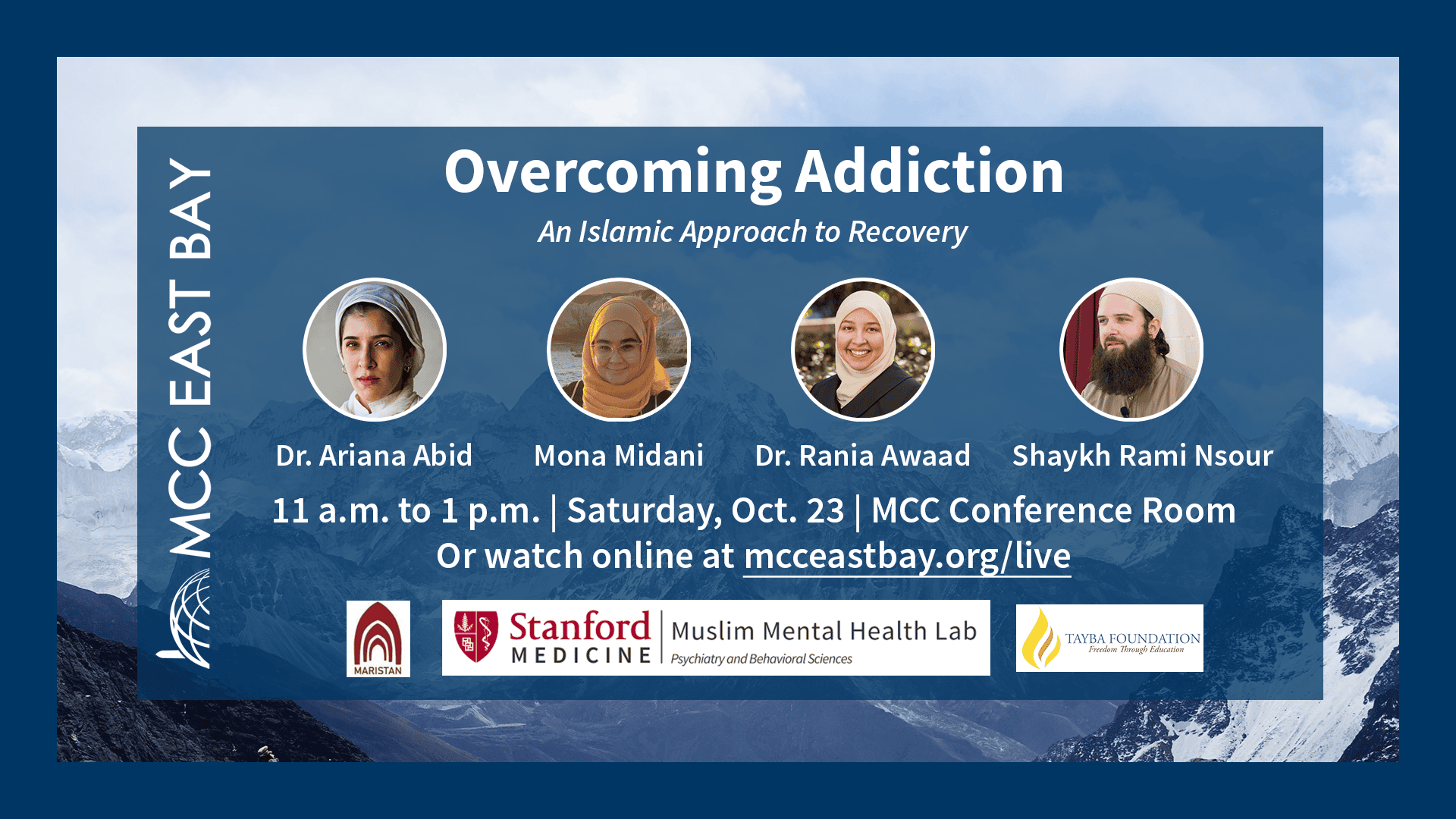Interested in learning more about the treatment of addiction? Want to learn the spiritual nature of addiction as a disease and how to positively shape healing in your community?
Join Dr. Ariana Abid, an addiction specialist, Mona Midani and Dr. Rania Awaad from Maristan and the Muslim Mental Health and Islamic Psychology Lab at Stanford Medicine, talk about the latest findings related to addiction treatment in the Muslim community and how the spiritual principles of the 12 steps can fit an individual’s Islamic practice, whether one is directly affected by addiction or not.
Shaykh Rami Nsour will speak about “Overcoming Addiction: An Islamic Approach to Recovery (OAIAR),” which a book for prisoners and written by prisoners.
11 a.m. to 1 p.m. | Saturday, October 23 | MCC Conference Room or watch online at https://mcceastbay.org/live
Sponsored by Maristan, Muslim Mental Health Lab and Islamic Psychology at Stanford, Tayba Foundation and MCC East Bay
– More talks about various forms of use in Muslim Community: https://mcceastbay.org/abuse
Questions? events@mcceastbay.org
This short seminar will be a continuation of our previous session on the use of marijuana and addiction is in the Muslim community and a post-pandemic restart of our confidential Substance Use Family Support groups. Learn more at https://mcceastbay.org/support-group
From ISPU: Substance Abuse and Addiction in the Muslim Community
Continuing to uncover insights from the American Muslim Poll 2020, a new analysis by ISPU Director of Research Dalia Mogahed explores the dynamics of stigma and support when it comes to substance addiction, abuse, and recovery in American Muslim communities.
Our research found that 37% of Muslims report personally knowing a person who has or is struggling with addiction, compared to 57% of the general public and roughly the same percentage among other faith groups. Other key findings from the analysis cover the stigmas that people in recovery from substance addiction face and levels of community support. For more information on the subject, read the analysis and consider attending our October 28 webinar on substance addiction and abuse.
Substance Abuse and Addiction in the Muslim Community: Facing Stigma and Seeking Support
AUGUST 25, 2021 | BY DALIA MOGAHED
According to the Addiction Center, the United States, the wealthiest nation on Earth, has seen a decrease in life expectancy since 2014. “Diseases of despair”— substance abuse and suicide—contribute significantly to this trend—and Muslims are not immune.
Consider these figures:
- Almost 21 million Americans have at least one addiction, yet only 10% of them receive treatment.
- Drug overdose deaths have more than tripled since 1990.
- From 1999 to 2017, more than 700,000 Americans died from overdosing on a drug.
- Alcohol and drug addiction cost the U.S. economy over $600 billion every year.
- In 2017, 34.2 million Americans committed a DUI, 21.4 million under the influence of alcohol and 12.8 million under the influence of drugs.
- About 20% of Americans who have depression or an anxiety disorder also have a substance use disorder.
- More than 90% of people who have an addiction started to drink alcohol or use drugs before they were 18 years old.
- Americans between the ages of 18 and 25 are most likely to use addictive drugs.
(Source: Addiction Center)
These alarming statistics, while based on studies of the entire American population, impact the American Muslim community as well.
Source: https://www.ispu.org/substance-abuse-and-addiction-in-the-muslim-community
Resources
- Al-Anon Family Group (for families with a loved one suffering through an addiction)
- East Bay Intergroup of Alcoholics Anonymous (for those suffering through an addiction)
- Alameda County Department of Public Health – Substance Abuse Resource List
- Alameda County Behavioral Health – Resource List and Helpline (1-844-682-7215)
Other Suggested Resources
- What Is Substance Abuse Treatment? A Booklet for Families
Created for family members of people with alcohol abuse or drug abuse problems. Answers questions about substance abuse, its symptoms, different types of treatment, and recovery. Addresses concerns of children of parents with substance use/abuse problems. - Alcohol and Drug Addiction Happens in the Best of Families
Describes how alcohol and drug addiction affect the whole family. Explains how substance abuse treatment works, how family interventions can be a first step to recovery, and how to help children in families affected by alcohol abuse and drug abuse. - It’s Not Your Fault (NACoA)
Assures teens with parents who abuse alcohol or drugs that, “It’s not your fault!” and that they are not alone. Encourages teens to seek emotional support from other adults, school counselors, and youth support groups such as Alateen, and provides a resource list. - It Feels So Bad: It Doesn’t Have To
Provides information about alcohol and drug addiction to children whose parents or friends’ parents might have substance abuse problems. Advises kids to take care of themselves by communicating about the problem and joining support groups such as Alateen. - After an Attempt: A Guide for Taking Care of Your Family Member After Treatment in the Emergency Department
Aids family members in coping with the aftermath of a relative’s suicide attempt. Describes the emergency department treatment process, lists questions to ask about follow-up treatment, and describes how to reduce risk and ensure safety at home. - Family Therapy Can Help: For People in Recovery From Mental Illness or Addiction
Explores the role of family therapy in recovery from mental illness or substance abuse. Explains how family therapy sessions are run and who conducts them, describes a typical session, and provides information on its effectiveness in recovery.




